If you are shopping for a new air-conditioning unit, one of the main considerations is whether to get an inverter aircon or non-inverter unit.
Inverter units claim to give more energy savings, and can cool a room faster compared to non-inverter units. However, inverter units also cost more.
To help you decide whether an inverter unit is worth the additional cost, read on.
Need aircon installation? Book our pros for express service! Or, need aircon servicing? We do that too
How does an aircon work?
To understand whether you need an inverter or non-inverter aircon, you should know the basics of aircons.
In its basic form, an aircon is made of an outside unit and an inside unit, connected by pipes. These pipes don’t carry cold air. Instead, the pipes contain a special gas called a refrigerant (think of the refrigerant gas like the blood in your body; it flows back and forth, but never escapes):
- The unit outside (called a compressor) cools down the gas
- The cold gas flows through the pipes into the room
- A blower blows normal air over the cold pipes. This makes the air cold
- The cold air cools down your room
All air-conditioning units have a compressor unit that sits outside the window or at the balcony, and a blower, or fan unit that is installed in your room.
The outdoor compressor and the indoor blower is connected by pipes. And the aircon gas (known as the refrigerant) flows back and forth in these pipes.
The outdoor compressor, as the name suggests, works to “squeeze” the refrigerant from gas to liquid form. This takes the heat out of it and expels it to the outside environment. The compressed refrigerant is then piped to the indoor unit.
At the indoor unit, the refrigerant is allowed to expand and turn back into a gas. When this happens, it absorbs the heat from the air around it, making it cool.
That cool air is blown into the room.
The expanded refrigerant is sent back to the outdoor compressor for another round of “squeezing”. And the cycle continues.
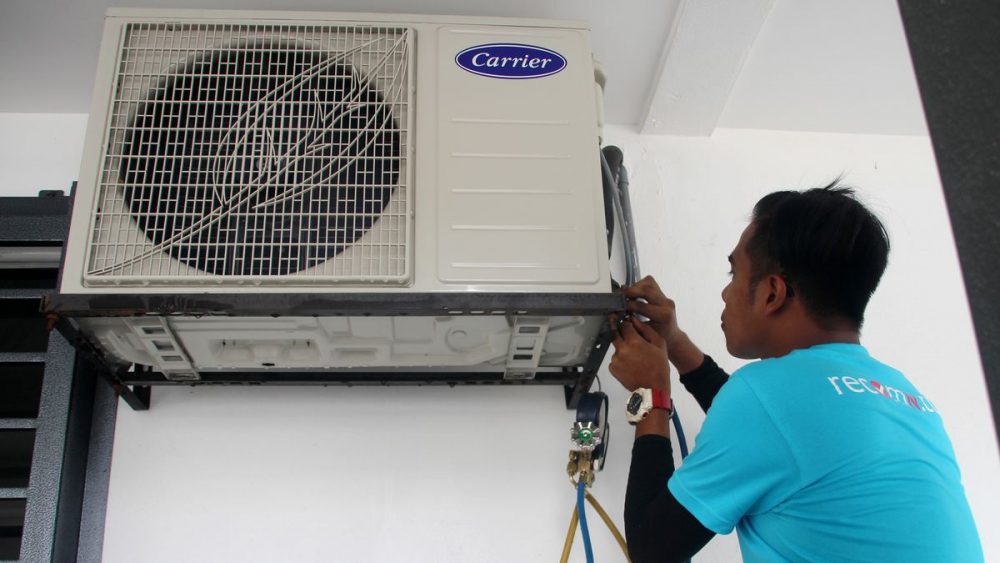
What is an inverter aircon?
An inverter aircon means that the outdoor compressor can slow down or speed up.
This is different from a non-inverter, where the compressor can only run at a single speed.
When you switch your aircon on, and set the temperature to 26 degrees Celsius (for example), the compressor starts working at full speed. This is the same for both an inverter or non-inverter aircon.
The difference is when the room has reached the desired temperature.
For a non-inverter aircon, the outside compressor unit will switch off entirely. The inside blower unit will keep blowing and circulate the air.
Since the compressor unit has stopped, the room will gradually start to warm up again. When it does, the outside unit will switch on at full speed again.
You can usually hear this start-stop operation happening at night, and it might disturb your sleep.
For an inverter aircon, the outside compressor unit will not switch off entirely. Instead, it will slow down and use less power to maintain the temperature.
Inverter Aircon Offers Greater Energy Savings
According to aircon manufacturers, non-inverter aircons consume more energy because of frequent start-stop operation.
But, because an inverter unit can slow itself down to maintain the room temperature, aircon manufacturers say that you can get up to 30% energy savings compared to non-inverter aircons.
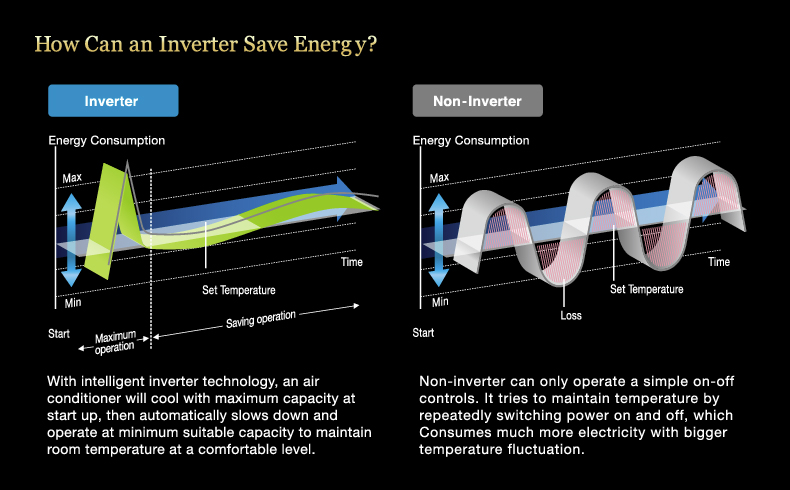
If that’s the case, why do I keep hearing about cases where an inverter aircon actually INCREASED energy bills?
There are situations where an inverter aircon may not help save energy.
One example is if you install an underpowered aircon for a room that is too large.
Whether or not you have an inverter or non-inverter aircon in this room, both will have to keep running at full speed to cool the room. There is just too much heat increase for the aircon to reach the desired temperature.
Some reports even claim that you will only get such energy savings if you use the inverter aircon for less than 8 hours a day. If you run the aircon 24/7, you may not get any energy savings compared to non-inverter units.

Inverter Aircons Are More Expensive. Does the power savings make up for the higher cost per unit?
Going simply by the 30% energy savings claimed by inverter aircon manufacturers, by our calculation, if you bought a 2HP inverter aircon unit instead of (a cheaper) non-inverter, it will take you 16.96 months to recover the price difference because of the energy savings. After that, you will save RM46 every month in energy costs.
Our calculation below:
When we checked online prices for Daikin aircons, the price of a non-inverter, 1 HP system-1 aircon unit was RM1299 compared to RM1599 for inverter; a difference of RM300.
For a 2 HP Daikin aircon, the difference is even greater; RM2799 for non-inverter vs RM3579 for inverter; a difference of RM780.
Calculating the energy cost:
Input power for 2HP non-inverter unit: 1835 W
Usage per day: 8 hours
Usage per month: 240 hours (assuming 30 days)
Power consumption per month: 1835 W * 240 hrs = 440400 Wh or 440.4 kWh
Tenaga Nasional tariff: 35 sen per kWh (average)
Total energy cost per month for non-inverter = 440.4 kWh * 35 sen = RM154.14
Since an inverter promises 30% savings:
Total energy cost per month for inverter = RM154.14 – 30% = RM107.90
That means that you save RM46.24 every month using an inverter aircon
And since the price difference between a 2HP inverter and non-inverter is RM780, it will take you 16.96 months to recover the cost.
Is it more expensive to maintain an inverter aircon?
Not really. Aircon servicing prices and rates differ only by about RM10 per unit between inverter and non-inverter units. Assuming you service your aircon 4 times a year, the difference is only RM40, which is about the same as 1 month of energy savings.
In addition, since the inverter aircon does not have to keep starting and stopping (compared to non-inverter), there is less wear and tear on the compressor and motor. This helps to prolong its life and save on replacement parts.
Watch: Inverter vs non inverter illustration
Which are the popular AC models in Malaysia?
When we checked how many people are searching for different brands of inverter ac on Google Malaysia, we found that Panasonic aircons get the most search, followed by Daikin ac and York ac.
However, other popular models include Acson, Mitsubishi, Samsung, Midea and Sharp.
Always check the energy consumption rating sticker given by the Energy Commission. More stars equals more savings.
Here are a few tips to know before buying your aircon
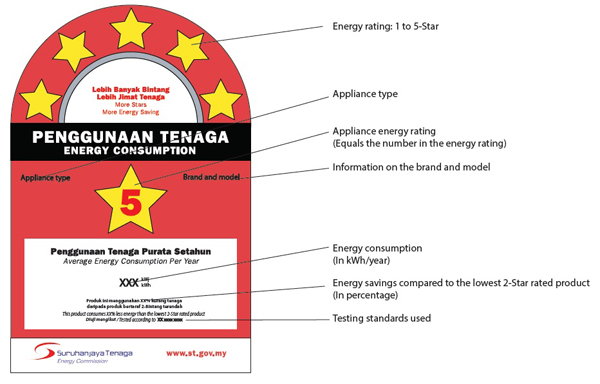
Conclusion
Inverter aircons are reported to have better energy savings than non-inverter aircons.
This is because they can slow down and speed up the compressor to maintain the same level of cooling.
Non-inverter aircons, on the other hand, can only run at a single speed. And when the desired temperature is reached, it will switch off. When it warms up again, it will switch on.
It is this frequent start-stop operation that consumes more energy compared to inverter aircons. Inverter aircons claim to give 30% energy savings because of this feature.
However, inverter aircons are more expensive. By our calculation, the additional cost compared to non-inverters will be recovered within a year and a half, and you get continuous energy savings after that. But this is assuming that you have a room where the start-stop operation is going to happen often.
Share this with someone who is planning to buy a new aircon!
Read more: Price of aircon installation and servicing in Klang Valley
Whether if it’s Panasonic, Daikin, wall-mounted units, or inverter aircons, our aircon pros can help you with the type of aircon installation you need.
Recommend.my has hundreds of reliable aircon contractors in Malaysia. Book your aircon installation or aircon servicing at our website and you also benefit from free damage insurance, and refund guarantee (terms apply).
Book aircon installation Book aircon service or chemical wash

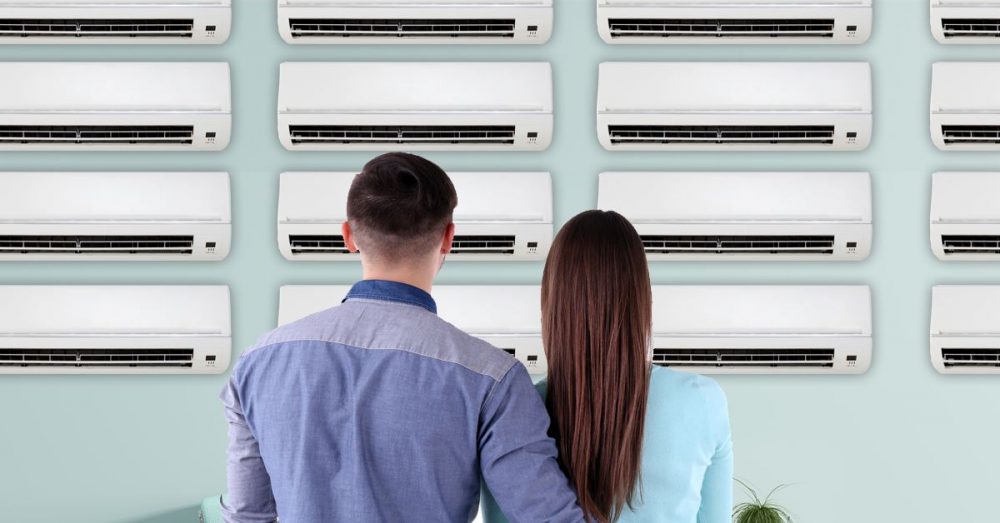

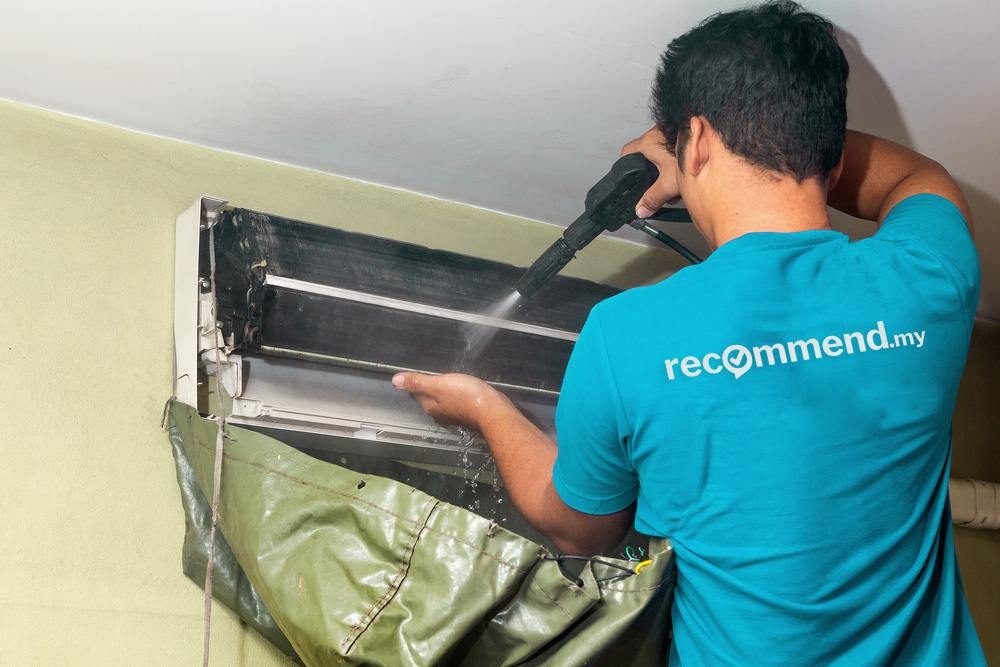
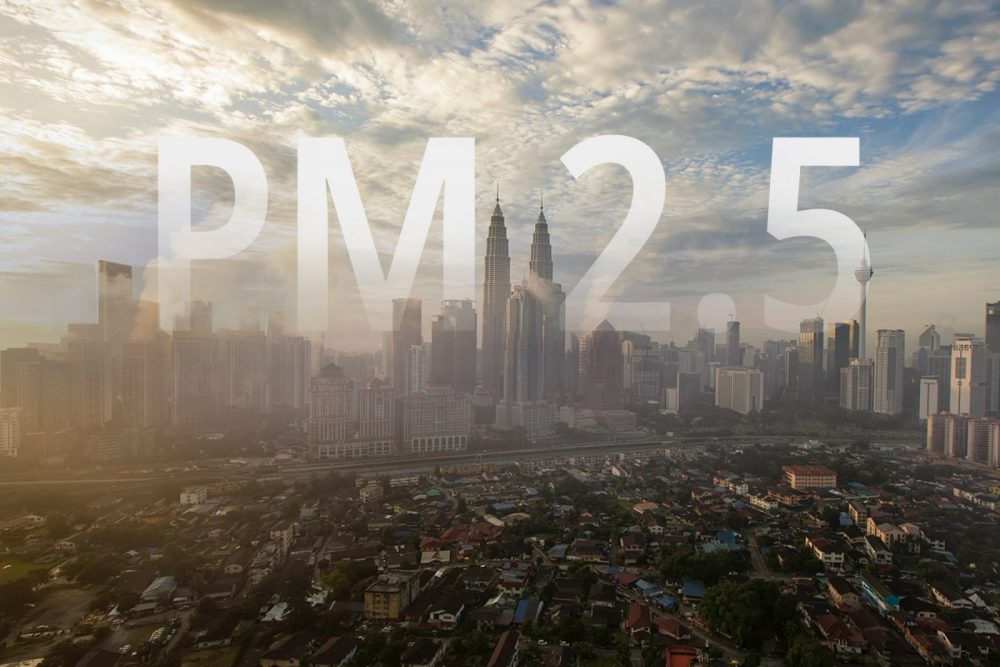
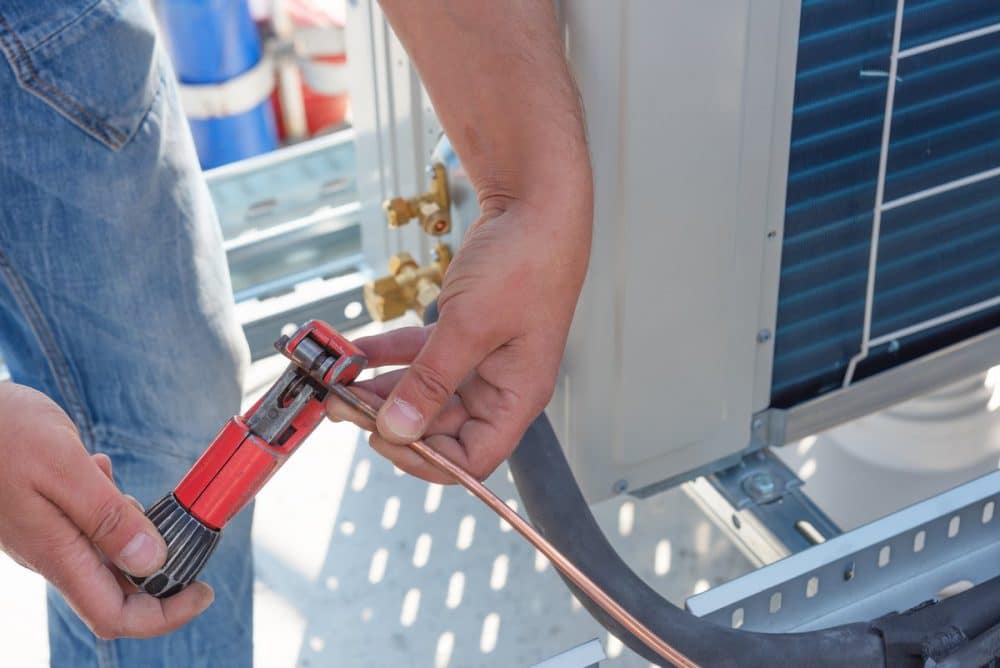
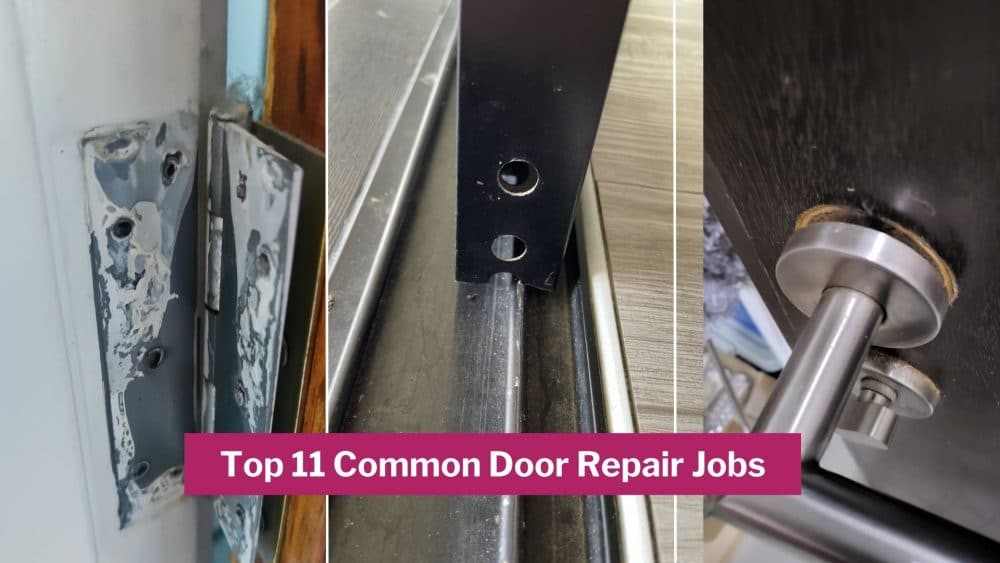
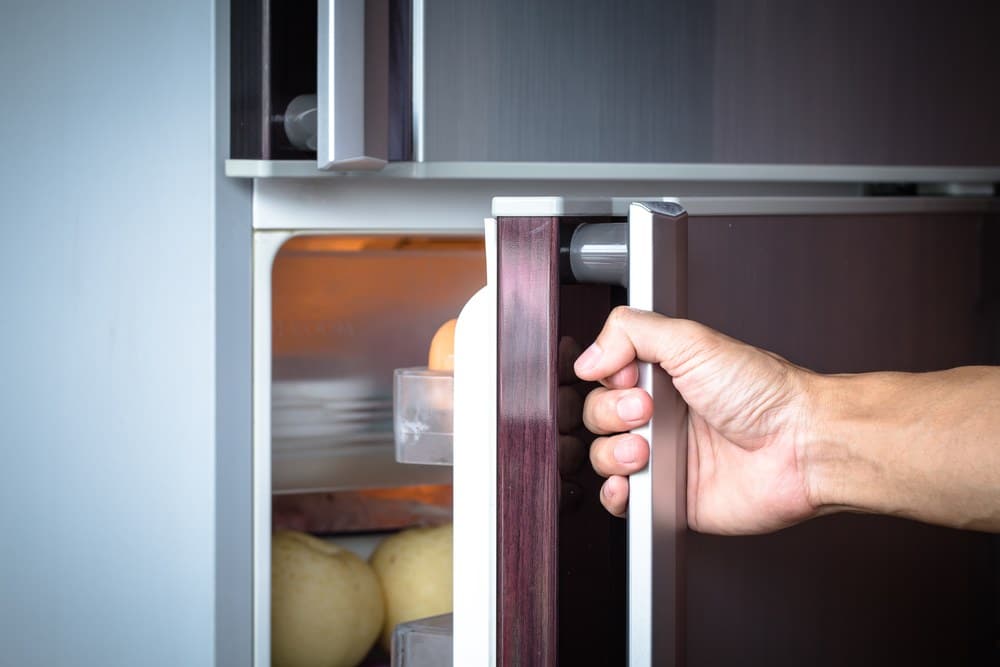

Pingback: 6 Things You Must Know If You Own an Air Conditioner - Recommend Living
The explanation for the inverter type air-cond is not very accurate, but acceptable.
Hi Ang thanks for the feedback! Which part is not accurate?
1. When you switch your aircon on, and set the temperature to 26 degrees Celsius (for example), the compressor starts working at full speed. This is the same for both an inverter or non-inverter aircon.
Reply : Normally inverter will go for higher speed (Max speed instead of rated).
2. According to aircon manufacturers, non-inverter aircons consume more energy because of frequent start-stop operation.
Reply : Non-inverter air-cond has higher power consumption is not due to frequent start/stop. Frequent start/stop will shorten the parts’ life span and cause voltage drop, but very minimum contribution to power consumption.
3. Aircon manufacturers say that you can get up to 30% energy savings compared to non-inverter aircons.
Reply : The energy saving is caused by part load operation. Meaning to say, the energy saving percentage is depends on application. For example, if the installed inverter a/c capacity equal or less than required capacity, then inverter a/c might consume much more power than non-inverter type. Conversely, saving of 60~70% is possible (compare with 2 star non-inverter a/c) if proper capacity selected and proper installed.
4. Aircon servicing prices and rates differ only by about RM10 per unit between inverter and non-inverter units.
Reply : Actually there should be no different between inverter and non-inverter in terms of servicing price. But there are 2 electrical boards at the outdoor unit (mainboard and power module), which are quite expensive. If either one is faulty, the cost will be quite high.
In addition, besides energy saving, inverter air cond can maintain a very consistent room temperature. It is a important advantage if compare with non-inverter. Generally, the temperature fluctuation for non-inverter is quite significant, which will affect the comfortable level (roughly 2 ~ 4 degree Celsius depends on models).
It depends on how you gain the knowledge, either theoretically “inverter air-cond” will begin to save energy after its maximum operation time (e.g. 8 hours). The question is, what happen if the air-con will never reach the temperature that we have set, for instance 16 degree. Thus, the benefit of having inverter airconds varies and depend greatly on how to use the aircond, whether our room is exposed to direct sunlight, etc etc. There is no fit equation that, inverter saves energy, but sometimes, you pay more instead. Each situation and context varies.
Do you mean that if the aircon will be used for 4 hours only per day, then no savings will be realized?
If the aircon will never meet the temperature we set, so useless is the inverter function, it will function as the non inverter type, which is the continuous running of compressor because the wrong capacity of aircon was being installed. I’m I right in this analization Sir?
Pingback: A complete list of aircon servicing price in Kuala Lumpur and Selangor - Recommend LIVING
Will it be wise/right to turn off completely the aircon if feels cold rather than to set the room temperature at 26 degree and let it running even if it is an inverter type? Then start the aircon after an hour or 2? Will this way shortened the life span of parts?
actually the energy saving is not because of the ‘compressor running at slow speed’ but the DC motor used in the compressor save energy compared to AC motor. There’s no such thing, i mean compressor to run slow as it has to compress the refrigerant at certain pressure. Just like you drive uphill very slow, wasn’t it consume more fuel?
Mr. Wan,
You can’t gave an example such as ‘Just like you drive uphill very slow, wasn’t it consume more fuel?’. You drive up hill very slow, actually you step more and keep pressing on the pedal compare drive slow on horizontal road and you can on and off step on pedal to maintain the speed. Drive up hill you will burn more fuel. Did you get it?
WAN what kind of analogy is that? uphill needs more fuel because the engine needs more power, an inverter has a variable compressor which means it adjust depends on the desired temp, unlike non inverter it will always run at max
Pingback: Apa Itu AC Inverter? Benarkah Dapat Menghemat Ratusan Watt?
Better set 28 and use a fan also! It saves you a lot of energy and you still have comfort.
Inverter aircon is very fragile, the two electrical boards always failed. I never had this problem with non inverter. And non inverter are always cooler. Speaking on my personal experiences, i have 14 units split units in my house and over 15 years i have change various units. New Panasonics are tofu, now i have been using Gree, i found that the btus are higher comparing the same hp and also they do last .
If the installed inverter a/c capacity equal or less than required capacity, then inverter a/c might consume much more power than non-inverter type. Conversely, saving of 60~70% is possible (compare with 2 star non-inverter a/c) if proper capacity selected.